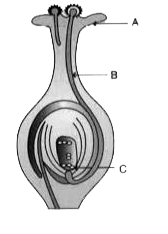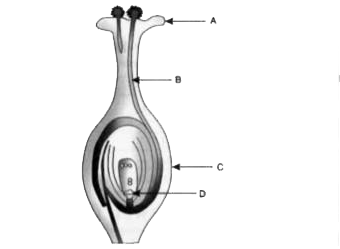Complete Solutions to TOPIC - 2 (SEXUAL REPRODUCTION IN PLANTS)(LONG ANSWER TYPE QUESTIONS) of chapter HOW DO ORGANISMS REPRODUCE? of Class 10 book with complete answers and questions
| Class 10 | BIOLOGY |
| Chapter | HOW DO ORGANISMS REPRODUCE? |
| OSWAAL PUBLICATION | TOPIC - 2 (SEXUAL REPRODUCTION IN PLANTS)(LONG ANSWER TYPE QUESTIONS) |
| Number Of Questions | 7 |
| Academic Year | 2023-24 |
(i) Define the terms pollination and fertilisation.
(ii) Distinguish between self pollination and cross pollination.
View SolutionWhat is pollination ? How does it occur in plants? How does pollination lead to fertilization? Explain.
View Solution(i) Give one example each of a unisexual and a bisexual flower.
(ii) Mention the changes a flower undergoes after fertilisation.
(iii) How does the amount of DNA remain constant though each new generation in a combination of DNA copies of two individuals?
View Solution(i) Draw a diagram showing germination of pollen on stigma of a flower.
(ii) Label pollen grain, male germ cells, pollen tube and female germ cell in the above diagram.
(iii) Define fertilization in plants.
View SolutionName the parts A, B and C shown in the diagram and write their functions.

View SolutionDraw a longitudinal section of a flower and label the following parts :
(i) Part that develops into a fruit
(ii) Part that produces pollen grain
(iii) Part that transfers male gametes
(iv) Part that is sticky to trap
View Solution(a) Identify A, B, and D in the given diagram and write their names.

(b) What is pollination? Explain its significance.
(c) Explain the process of fertilization in flowers. Name the parts of the flower that develop after fertilization into
(i) seed,
(ii) fruit.
View Solution
TOPIC - 2 (SEXUAL REPRODUCTION IN PLANTS)(LONG ANSWER TYPE QUESTIONS) questions and complete solutions for chapter HOW DO ORGANISMS REPRODUCE? of OSWAAL BIOLOGY (KANNADA ENGLISH) of Class 10
All Exercises from OSWAAL PUBLICATION Class 10 BIOLOGY HOW DO ORGANISMS REPRODUCE?
- NCERT CORNER (TEXTBOOK EXERCISES)
- NCERT CORNER (INTEXT QUESTIONS)
- TOPIC - 1 (BASICS OF REPRODUCTION, ASEXUAL REPRODUCTION AND VEGETATIVE PROPAGATION)(LONG ANSWER TYPE QUESTIONS)
- TOPIC - 1 (BASICS OF REPRODUCTION, ASEXUAL REPRODUCTION AND VEGETATIVE PROPAGATION)(MATCH THE COLUMN)
- TOPIC - 1 (BASICS OF REPRODUCTION, ASEXUAL REPRODUCTION AND VEGETATIVE PROPAGATION)(MULTIPLE CHOICE QUESTIONS)
- TOPIC - 1 (BASICS OF REPRODUCTION, ASEXUAL REPRODUCTION AND VEGETATIVE PROPAGATION)(SHORT ANSWER TYPE QUESTIONS - I)
- TOPIC - 1 (BASICS OF REPRODUCTION, ASEXUAL REPRODUCTION AND VEGETATIVE PROPAGATION)(SHORT ANSWER TYPE QUESTIONS - II)
- TOPIC - 1 (BASICS OF REPRODUCTION, ASEXUAL REPRODUCTION AND VEGETATIVE PROPAGATION)(VERY SHORT ANSWER TYPE QUESTIONS)
- TOPIC - 2 (SEXUAL REPRODUCTION IN PLANTS)(LONG ANSWER TYPE QUESTIONS)
- TOPIC - 2 (SEXUAL REPRODUCTION IN PLANTS)(MATCH THE COLUMN)
- TOPIC - 2 (SEXUAL REPRODUCTION IN PLANTS)(MULTIPLE CHOICE QUESTIONS)
- TOPIC - 2 (SEXUAL REPRODUCTION IN PLANTS)(SHORT ANSWER TYPE QUESTIONS - I)
- TOPIC - 2 (SEXUAL REPRODUCTION IN PLANTS)(SHORT ANSWER TYPE QUESTIONS - II)
- TOPIC - 2 (SEXUAL REPRODUCTION IN PLANTS)(VERY SHORT ANSWER TYPE QUESTIONS)
- TOPIC - 3 (REPRODUCTION IN HUMAN BEINGS)(LONG ANSWER TYPE QUESTIONS)
- TOPIC - 3 (REPRODUCTION IN HUMAN BEINGS)(MATCH THE COLUMN)
- TOPIC - 3 (REPRODUCTION IN HUMAN BEINGS)(MULTIPLE CHOICE QUESTIONS)
- TOPIC - 3 (REPRODUCTION IN HUMAN BEINGS)(SHORT ANSWER TYPE QUESTIONS - I)
- TOPIC - 3 (REPRODUCTION IN HUMAN BEINGS)(SHORT ANSWER TYPE QUESTIONS - II)
- TOPIC - 3 (REPRODUCTION IN HUMAN BEINGS)(VERY SHORT ANSWER TYPE QUESTIONS)